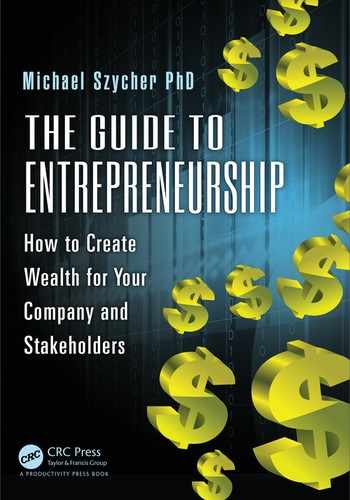
6 ◾ The Guide to Entrepreneurship: How to Create Wealth for Your Company
Table1.2 Entrepreneurial FAQ
Are entrepreneurs born or made (nature vs. nurture)?
“Ride the horse in the direction it is going.”
Successful entrepreneurs are usually born with an inherent ability in a given eld
(similar to playing piano or guitar), years of formal academic training, technical
experience, contacts, know-how, and self-development. Thus, entrepreneurs are
both born and made.
Can anyone start a business, anywhere, and at any time?
Fortune cookie: “To open a business very easy. To keep open very difcult.”
The easiest part is starting; the hardest part is surviving and growing a venture that
will create value for its founders and shareholders.
Are entrepreneurs gamblers or risk managers?
“A ship is safe while in harbor, but that is not what a ship is built for.”
Entrepreneurs stack the odds in their favor by minimizing risks. Gamblers do not
change the odds; they just play the game.
Entrepreneurs do not seek uncompensated risks, but conversely do not shy away
from unavoidable risks.
Do entrepreneurs want to be the only star of the show?
“Half of this game is 90% mental.”
Entrepreneurs have the vision, ability, and courage to start a new venture;
therefore, for quite some time the limelight has been directly on them as
individuals. Eventually, the entrepreneur needs to build a team, an organization,
and a sustainable company; at that time, the whole stage lights up with all
participants sharing in the applause.
Are entrepreneurs really their own bosses and completely independent?
“You can either complain that bushes have thorns—or rejoice that thorns have
roses.”
Ironically, the more successful the enterprise, the more “bosses” you will have. So
much for “independence.”
Entrepreneurs serve many masters and constituencies, including partners,
investors, suppliers, creditors, bankers, lawyers, employees, advisors, consultants,
distributors, and agents. These entities are collectively known as “stakeholders.”

Entrepreneurial Timber ◾ 7
Table1.2 Entrepreneurial FAQ (Continued)
Do entrepreneurs work harder and longer than comparable managers do?
“Commitment is like muscle; it is strengthened by use.”
Most entrepreneurs wish for a 9-day week. Time is their most implacable enemy.
Starting a new venture is a lifestyle commitment; the entrepreneur must be willing
to dedicate as much time as necessary to ensure success. Otherwise, it is a hobby.
An entrepreneur is willing to work 16 hours a day for himself instead of only 8
hours for someone else.
Is entrepreneurship stressful and demanding?
“You must break eggs to make omelets.”
Starting a new business is stressful and demanding, but also highly rewarding. You
will be faced with daily emergencies, personnel problems, governmental
regulations, nancial pressures, technical failures, etc. The list is endless.
But this is your baby! It is like childbirth: you cannot do it alone, it is a bloody
mess, and you will not sleep for months.
Is money the most important ingredient?
“Money is not everything, but it is way ahead of whatever is second.”
Undercapitalization is among the top three reasons for venture failures. Sixty
percent of new businesses fail in the rst three years primarily due to
undercapitalization.
However, money alone is not enough. The founder must also develop a good initial
plan, execute, and follow up.
Do entrepreneurs need to understand nancial statements?
“Waiting to be treated fairly because you are fair is like expecting the bull not to
charge because you are a vegetarian.”
If you lack a basic understanding of nancial statements, you will be treated
unfairly. Know your numbers cold!
Are entrepreneurs always young and energetic?
“Only those who risk going too far will ever know how far they can go.”
According to the National Federation of Independent Businesses and Wells Fargo
Bank survey conducted in 2002, 57% of all businesses were started by persons 35
years or older. Age brings experience and judgment. It is too bad that youth is wasted
on the young.
(Continued)

8 ◾ The Guide to Entrepreneurship: How to Create Wealth for Your Company
Table1.2 Entrepreneurial FAQ (Continued)
Do entrepreneurs seek unlimited power over others?
“Use your power to create respect and esteem.”
By virtue of their accomplishments, entrepreneurs earn power. Power is conferred,
not taken. Power is a by-product of achievement, and only grows with time.
If an entrepreneur is sufciently talented, is success assured in a couple of years?
“Lemons ripen in two years, but pearls take seven or eight years.” (old venture
capital maxim)
Most businesses are lucky to break even in 4 to 5 years from startup.
Can anyone with just a good idea be funded?
“Ideas are a dime a dozen. Have you proven the concept?”
While great projects always start with good ideas, ideas alone rarely raise money.
The entrepreneur must put “skin in the game” by self-funding the concept.
If an entrepreneur is well funded, is he or she invincible?
“A fool and his money are soon parted.”
Too much initial capital may well be a detriment as the founder may suffer too
much dilution and may start acting like a spoiled brat.
Are entrepreneurs lone wolves that cannot work with others?
“Entrepreneurs are like Formula 1 race-car drivers: they should not forget about
their pit crew.”
Successful entrepreneurs are skilled at selecting, training, and nurturing a great
team. No lone wolves here—backing from a great team will lower risks.
If you fail in one venture, can you ever raise funds again?
“When God closes a door, he opens a window.”
Businesses fail, but entrepreneurs do not. Failure is often the re that tempers the
entrepreneurial metal. A lack of fear of failing is a distinguishing entrepreneurial
trait.
Failure is a station on the way to success. Successful entrepreneurs accept failure
professionally.
Are entrepreneurs solely motivated by nancial rewards?
“If we are so rich on paper, why are we still driving a Pinto?”
Entrepreneurs are more motivated by the opportunity to create their own world, do
what they enjoy most, and desire recognition of their accomplishments more so than
realizing long-term capital. Nonetheless, because wealth is actively sought in our
society, achieving multi-millionaire (or multi-billionaire) status doesn’t hurt either.

Entrepreneurial Timber ◾ 9
Characteristics
High achiever
Risk manager
Problem solver
Status seeker
High energy level
Self condent
Maximum responsibility and authority
Craves personal satisfaction
Figure 1.5 Characteristics—The eight characteristics that predict success in business
founders.
Table1.3 Success Characteristics
High achiever Inexhaustible commitment and enthusiasm. Maxim:
Create like a god; command like a king; work like a
slave.
Risk manager The entrepreneurial equation: Value = Rewards/Risks
The name of the game is to lower your technical,
managerial, marketing, and regulatory risks for your
investors.
Problem solver Edison did not invent the light bulb. He solved the
problem that 22 others who preceded him failed to do.
Status seeker “It is easier to go down a hill than up, but the best view
is from the top.” Be the undisputable leader and
visionary.
High energy level “Success is largely a matter of hanging on after others
have quit.” Hang in there until you succeed.
Self condent “If you don’t believe in yourself, who will?” Sell
yourself rst, then the venture.
Maximum
responsibility and
authority
“If there is no wind, row.” Only you can make the
venture succeed. Develop a high tolerance for possible
failures.
Craves personal
satisfaction
“Only dead sh swim with the current.” Lead and you
will be personally rewarded.

10 ◾ The Guide to Entrepreneurship: How to Create Wealth for Your Company
Table1.4 Failure Characteristics of “Management Incompetence”
Underfunding Accepting dangerously low initial
funding in hopes of reaching
milestones that will bring additional
cash in the future.
Inability to raise follow-up funding A corollary of underfunding.
Creating dissatised investors.
Cash ow management Cash is king. Run out of cash and you
will run out of luck.
Extravagant operating expenses The “Taj Mahal” complex. Trying to
impress investors with the latest
gadgets, overly impressive
headquarters, expensive shiny
brochures, etc.
Overestimating your true market size This is a crucial marketing research
failure. One of the top ten mistakes
made by inexperienced founders.
Ignoring your competition “Keep your friends close, and your
enemies even closer.”
Underestimating your development
costs
Remember the old maxim: “It will cost
you twice as much and take you twice
as long as you thought.”
Inability to comply with regulations Regulations never get easier; they only
get tougher.
No real competitive advantage
Poor sales forecasts Without sales, there is nothing to
manage. Be realistic about your sales
projections and “make your
numbers.”
Wrong business model A business model incorporates all the
activities that dene how a rm will
compete in the marketplace. What is
your value chain?
Not understanding customers’ needs Do your product features solve
customers’ problems? If not, your
product is merely a “Me, too.”
..................Content has been hidden....................
You can't read the all page of ebook, please click here login for view all page.
